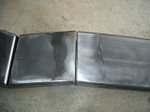Real Estate Investing 201
Digging a little deeper into Flipping
In Real Estate Investing 101, Part I, we covered buying a house to resell for a short term profit. In this lesson, we’re going to delve a little deeper into flipping, run a scenario, and examine ways to maximize profit, while minimizing risk and making it happen fast.
Homes may be in almost any price range. Condos may be purchased for as little as $40k, but sometimes there are opportunities with homes prices at $1M or more. In fact, the pricier homes have some advantages in some markets. Let’s cover a few price levels:
$200k to $400k – Pro- Fewer competitors bidding up prices, often a little larger pool of properties to pick from, usually higher margins. Con- Requires more capital, appropriate level of fixtures and finishes more important.
Over $700k – Pro- Often more generous margins, little competition, fewer buyers that will do work themselves, more fun to make (home theaters, high-end kitchens, etc.). Con- Bring your checkbook, higher level of capital needed, wrong finishes and fixtures will kill chances of a sale, tastes may be fickle.
Over course, you may have noticed that I left generous gaps. These are guidelines, and in different markets, the actual prices will need to be adjusted.
Putting together the numbers
When filling out the spreadsheet, the light gray areas are for users to input information. The light green areas have calculated values. Remember, the more accurate the input information, the more accurate your profit analysis will be.
Putting together a team
Real Estate Agent- A good agent will know what is on the market, and should be able to quickly determine what a good ARV (After Repair Value) for a given property will be. This agent will also know how to price the property to maximize return. That doesn’t always mean maximum price, those closing costs can add up, and if one’s capital is tied up, one can’t move to the next project.
Inspector- Spending a few hundred dollars for a good inspection is money well spent. Missing a failing HVAC system or a roof issue could cost thousands. Knowing that a particular siding or electrical has shown itself to be unreliable can also be very valuable. If one can find an inspector that will give good cost estimates of repairs and upgrades that need to be performed, one may be able to cut down on the number of contractors that need to be consulted prior to buying a property.
Contractors- These contacts can make or break a flip. If the work is good, fast, and appropriately priced it is well worth paying to have it done. Saving a few hundred dollars and spending a few thousand in carrying costs while you wait for a contractor that is behind schedule is not a good trade. Saving a few thousand, and then having to spend money to fix what wasn’t done well is also not a good trade… especially when you have to carry the property that much longer to get everything done.
Project Coordinator- If more than a couple of projects are running, having a person to help keep everything on track is vital. Even the best contractors will have people that need someone to make sure they are there on time, and doing the right work. Even the best flipper needs a second opinion, and someone to run errands or get the right materials.
Mortgage or Commercial Loan Broker- Carrying costs are another make or break expense. Having the capital to complete the project is a requirement. Being able to continually finance projects is also required. Most mortgage lenders (not brokers) don’t want to loan money to flippers without front loading. They make money by either carrying the loan, or charging up front fees. Since the goal is to NOT carry the property, they need to front load the fees. A good loan source can DRAMATICALLY lower your costs.
Selling strategies
Stage the property. A vacant house makes it harder for buyers to mentally move in. A few rooms that are well staged will really increase the value in the minds of buyers, so it is generally well worth the cost. This is especially true for higher end homes, but may be the thing that tips the balance for ANY property.
Price it appropriately. Many experienced flippers will price a property 3%-5% below market in order to make it sell faster. This reduces “opportunity costs” and also lowers risk.
Research. Plan. Prepare. Remember the old adage that it takes money to make money. This holds true in flipping real estate as well. But, it is vital that the money be appropriately targeted, well managed, and strictly controlled. This doesn’t mean that it shouldn’t be spent, but that it should be spent on the right things, and taking shortcuts may not be the best idea.









No comments:
Post a Comment